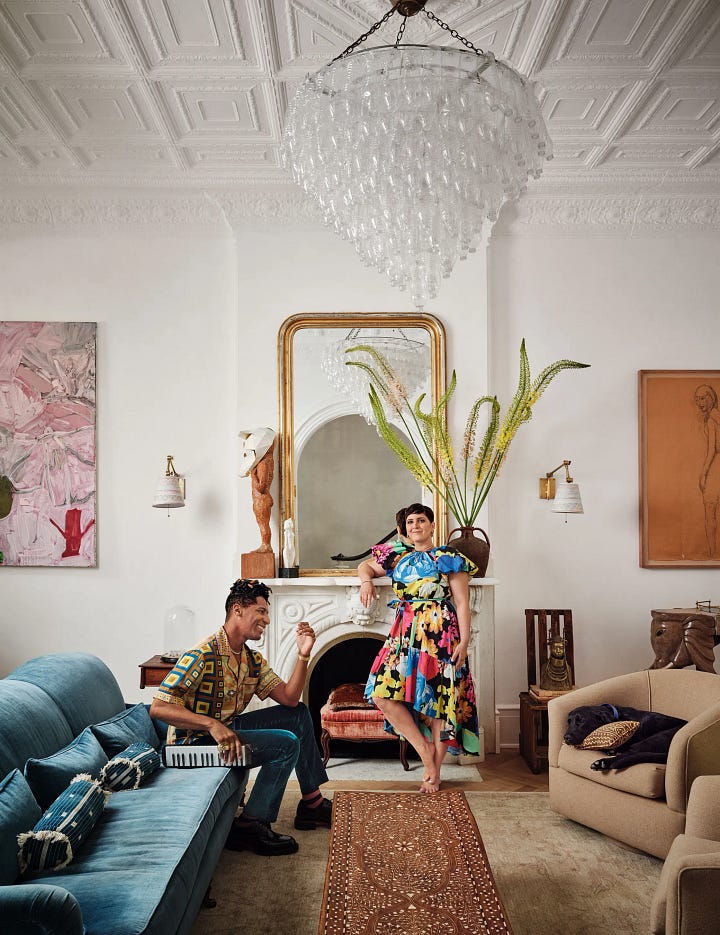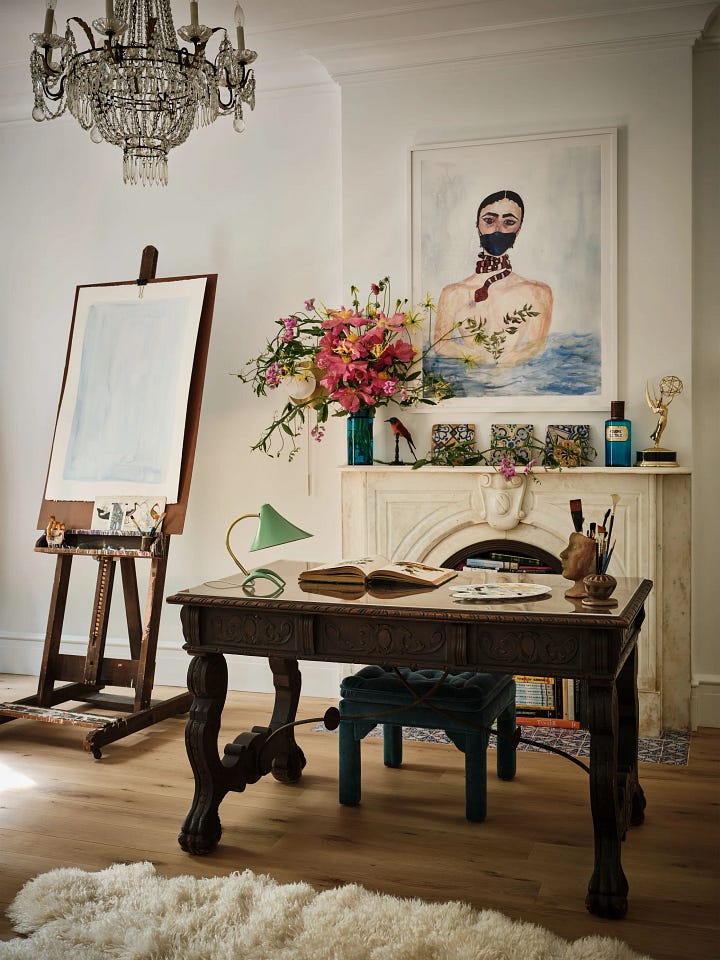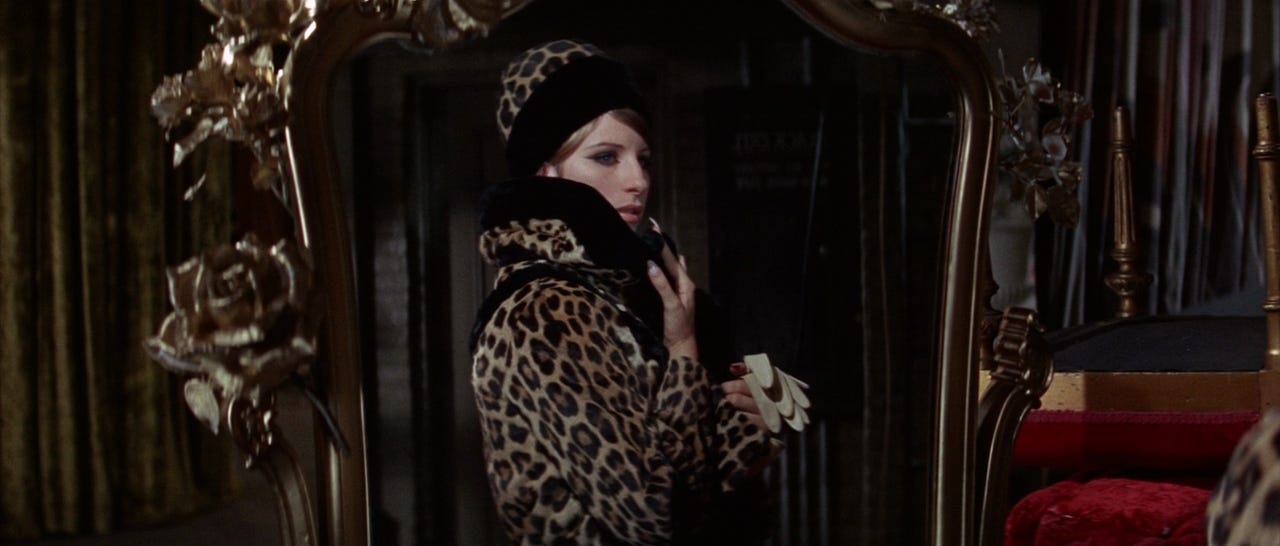Open to It All
Survival as a creative act, plus my top ten books of the year


The Sunday Letter #40
The other night, I watched American Symphony, a new Netflix documentary about creative supercouple Jon Batiste and Suleika Jaouad as they navigate his musical achievements amidst her recurring cancer treatments. What begins as a documentary about Batiste’s American Symphony project—in which he creates a modern symphony for a one-night only Carnegie Hall audience—shifts into something else entirely when Jaouad receives the news that her leukaemia has returned. At turns devastating and intense, American Symphony is a love story about two creatives completely in tune, and a love built entirely on patience, trust, and admiration.
The film is also a poignant tribute to the uncertainty of life. When Jaouad’s chemotherapy leads to her having visions, she starts to paint from bed much like a modern Frida Kahlo—her art, featured prominently in her suitably light-filled home, is brilliantly evocative of Kahlo’s own journey with sickness and creativity. Throughout the film, Batiste and Jaouad stay wondrously in sync, often communicating with a look or a whisper. She calls him on Facetime to show a new work in progress, which he notes is apocalyptic, Biblical, and angelic, like a “fever dream Noah’s Ark.” “Yes, that’s exactly what I’m going for,” Jaouad nods along excitedly.
“Survival is a creative act,” Jaouad explains. They are two artists navigating the extremes of life and learning to hold it all at once. We watch as Batiste contends with intense anxiety behind the scenes while maintaining a positive exterior on television every night as the bandleader for Stephen Colbert’s late show, zipping in and out of Jaouad’s hospital room between performances. Her book is on the New York Times bestseller list, he reminds us. Their journeys are in tandem as they take each day as it comes. She cheers along from home as he wins Album of the Year at the Grammy’s, but when he returns to her, she’s back in the hospital.
Jaouad is stoic throughout, but we see the profound heaviness on her shoulders as she receives a standing ovation from her doctors and nurses in the hospital hallway when she leaves her last cancer treatment. In my experience, the end of cancer treatment felt tremendously bittersweet, somehow a relief and guilt-inducing all at once. But as Jaouad herself says in the film, recalling her first time with cancer, to emerge from the other side leaves one feeling desperate to live a life of adventure and meaning. It is a gift, though a heavy one.
“I don’t want to have tough skin,” Jaouad says in a voiceover, “I want to be open to it all.” To be open to the darkest parts of life and the mind, and to still be willing to share it in words, unconcerned with how the world may read it: that, to me, is a tremendous bravery.
And when this brave woman needs to keep dancing in the hospital halls when her energy is fading, it’s Batiste to whom she looks. Exhausted, he musters his own reserves to tell her it’s not the time to give up. Together they keep dancing.
“You have to confront the brutal facts of the reality that you might not pull it off,” Batiste tells us as he prepares for his symphony performance. “But at the same time, have unwavering faith. Completely unwavering faith. And you have to do both at the same time.”
A love story for the ages, and I’m grateful I could witness it.
Best of 2023
In the spirit of reminiscing, I’ll be counting down the last few weeks of 2023 with a new “best of” list every Sunday. Starting off with books, these were my favourite reads of the year, in order of first to last read:
Second Place by Rachel Cusk (2021): “A woman invites a famous artist to use her guesthouse in the remote coastal landscape where she lives with her family.” A mysterious jaunt into Cusk’s brain, delightful as always.
The Baby on the Fire Escape: Creativity, Motherhood, and the Mind-Baby Problem by Julie Phillips (2022): “What does a great artist who is also a mother look like?” Inspiring and breathtaking accounts of the lives of various artists and their engagement with motherhood in their practices.
Sula by Toni Morrison (1973): “Two girls who grow up to become women. Two friends who become something worse than enemies.” A haunting ode to female friendship, with the magnetism of Morrison’s gothic syntax.
Beloved by Toni Morrison (1987): “A spellbinding novel that transforms history into a story as powerful as Exodus and as intimate as a lullaby.” There is no one like Toni Morrison, an artist capable of literary precision unlike any other. A spellbinding fever dream.
Artful by Ali Smith (2012): “Ali Smith melds the tale and the essay into a magical hybrid form, a song of praise to the power of stories in our lives.” A perfect rumination on the nature of creativity and writing.
My Brilliant Friend by Elena Ferrante (2011): “The enduring masterpiece about a lifelong friendship between two women from Naples.” Ferrante continues to amaze with her brutal dissections of girlhood and the viciousness of youth. I look forward to picking up the rest of the series in the new year.
A Woman’s Story by Annie Ernaux (1987): “A deeply affecting account of mothers and daughters, youth and age, and dreams and reality.” Ernaux confronts the class differences between her and her mother in a haunting memoir.
Boulder by Eva Baltasar (2022): “Working as a cook on a merchant ship, a woman comes to know and love Samsa, a woman who gives her the nickname, ‘Boulder.’” Completely redefined what literature could be for me. With diction like no other, this was a triumph of translation.
I’m a Fan by Sheena Patel (2023): “A devastating critique of class, social media, patriarchy’s hold on us, and our cultural obsession with status and how that status is conveyed.” I was spellbound by Patel’s brazen rule breaking on nearly every page; an exemplar work for the unhinged women’s genre.
A Life’s Work: On Becoming a Mother by Rachel Cusk (2001): “Cusk’s honest memoir that captures the life-changing wonders of motherhood.” Brusk and raw, and far ahead of its time, as is typical of Cusk.
Honourable mentions: Cold Enough for Snow, Strangers to Ourselves, Lives of Girls and Women, The Lover, and Bad Behavior.
What was the best book you read this year? Let me know below!
This week’s recommendations
In May December (2023), director Todd Haynes keeps the audience at a distance, much like his characters do with each other. In a conversation between 36-year old Joe (Charles Melton) and Elizabeth (Natalie Portman), the actress who will be playing his much-older wife in a movie role, Joe emphasizes that he doesn’t see himself as a victim. But we see throughout the course of the film that Joe’s life has been stunted at the young age of thirteen, when he met his future wife Gracie (Julianne Moore). Moore and Portman are both captivating, but it’s Melton as Joe who devastates as the man they poke and prod at for attention and validation, ignoring his own arrested development. In fact, much of the film seems to indict the way insidious behaviour is either ignored or left unseen. “This is just what grownups do,” Elizabeth consoles and condescends to Joe, a man who cares endlessly for others with no one checking in on him. One of the first shots of the film is a butterfly laying eggs, a motif that appears invasive at first glance. But later on, when Elizabeth asks Joe about his hobby of raising endangered butterflies, he tells her, “You just keep your eyes open, and look for the eggs. Take them inside, and protect them, so they have a chance to grow.” A claustrophobic wonder; I really hope to see Melton recognized this awards season, because he is the emotional core of the film.
It was a Barbra Streisand appreciation week in this house, with both The Way We Were (1978), definitely Sally Rooney’s original inspiration for Normal People, and Funny Girl (1968), a rightfully iconic testament to funny girls everywhere.
Friends with Money (2006), the anti-Barbra film in that everyone in it was completely devoid of charm, and after also being disappointed in The Last Duel and You Hurt My Feelings, I may have to accept that I just don’t get Nicole Holofcener’s whole vibe.
*
Hailey Colborn’s gift guides for people who don’t exist.
Amil Niazi asks why TikTok’s version of pregnancy is such a nightmare.
On the TikTok train, why is the dating advice so regressive and sexist?
Kate Dwyer asks whether the campus novel is dead.




My homie and I are planning to check out American Symphony, thanks for the rec! I’m also a big fan of Sula & Beloved. Toni Morrison’s pen game is unmatched. Especially in Sula, I appreciate how beautifully she wrote about Nel & Sula’s friendship, as well as how they come to know themselves deeper in solitude.
I’m on the second Ferrante novel from the Neapolitan quartet right now, I’m loving it so much. Also, those pictures at the top are everything😭